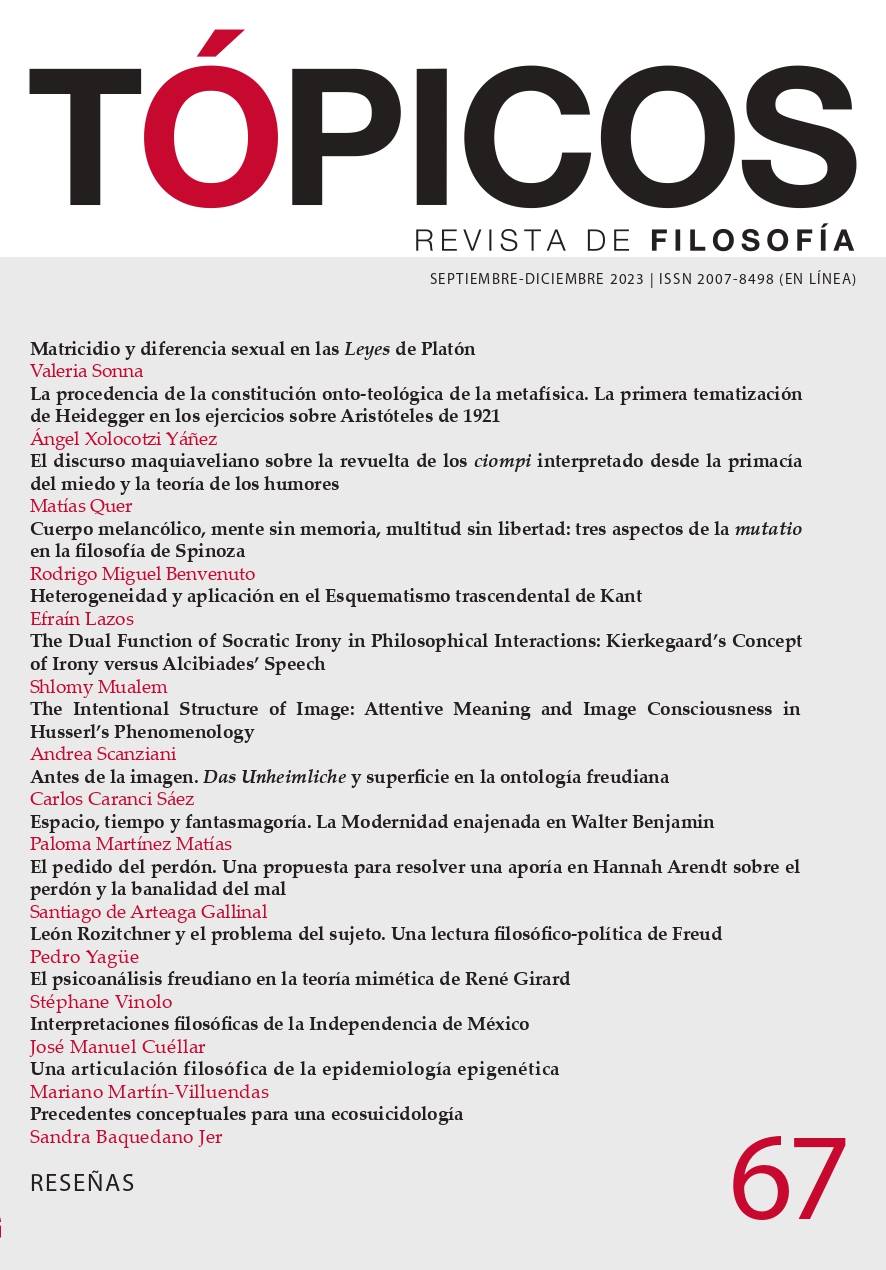Publicado 2023-08-01
Palabras clave
- Platón,
- Leyes,
- mujeres,
- diferencia sexual
Derechos de autor 2023 Tópicos, Revista de Filosofía

Esta obra está bajo una licencia internacional Creative Commons Atribución-NoComercial-SinDerivadas 4.0.
Cómo citar
Resumen
Es intrigante el tratamiento de la diferencia sexual en el código penal de Leyes, que en Lg. 872d1-873 propone como la pena más justa para el matricida el nacer formando parte de la naturaleza femenina para ser asesinado luego por sus hijos. Es notable, asimismo, que aunque este código penal ha sido objeto de un análisis detallado por algunos especialistas, un gran silencio envuelve este punto. Esto es elocuente con respecto a la dificultad hermenéutica que presenta, para los estudios de la filosofía griega, toda problemática que involucre la representación de la mujer y de lo femenino. Mi propuesta es abrir algunas líneas de exégesis que puedan contribuir a un análisis del contenido del texto. Intentaré mostrar que el tratamiento del matricidio, además de remitir a la irreductibilidad de los sexos, puede leerse en clave sociopolítica si tenemos en cuenta los elementos que en la literatura griega se asocian a la maternidad como institución.
Referencias
- Sófocles. (2003). Tragedias J. S. Lasso de la Vega (ed.). A. Alamillo (trad.). Gredos.
- Annas, J. (1976). Plato’s Republic and Feminism. Philosophy, 51(197), 307-321. DOI: https://doi.org/10.1017/S0031819100019355.
- Bieda, E. (2021). Aristóteles frente al examen platónico de la voluntariedad práctica en Leyes. Quaderni urbinati di cultura classica, 1. DOI: https://doi.org/10.19272/202106401005.
- Burnyeat, M. F. (1977). Socratic Midwifery, Platonic Inspiration. Bulletin of the Institute of Classical Studies, 24, 7-16.
- Chantraine, P. (1999). Dictionnaire étymologique de la langue grecque : Histoire des mots. Klincksieck.
- Chase, A. H. (1933). The Influence of Athenian Institutions upon the Laws of Plato. Harvard Studies in Classical Philology, 44, 131-192.
- Clay, D. (1982). Unspeakable Words in Greek Tragedy. The American Journal of Philology, 103(3), 277-298.
- Cohen, D. (1987). The Legal Status and Political Role of Women in Plato’s Laws. Revue Internationale des Droits de l'Antiquité, 34, 27-40.
- De Béchillon, M. (2013). Violences familiales dans l’Antiquité grecque : Permanence d’un questionnement juridique. Anabases, 17, 243-248. DOI : https://doi.org/10.4000/anabases.4231.
- Dumortier, J. (1935). Le vocabulaire médical d’Eschyle et les écrits hippocratiques. Les Belles Lettres.
- Ernoult, N. (1996). Les femmes dans la cité platonicienne. La figure féminine dans la République et les Lois. [Tesis doctoral]. École des Hautes Études en Sciences Sociales.
- Esquilo. (2002). Tragedias. I. M. Fernández-Galiano (ed.). B. Perea-Morales (trad.). Gredos.
- Eurípides. (2018). Tragedias. I. El cíclope. Alcestis. Medea. Los heráclidas. Hipólito. Andrómaca. Hécuba. A. M. González (trad.). Gredos.
- Gernet, L. (1951). Les Lois et le droit positif. En Platon, Œuvres complètes. Tome XI, 1re partie : Les Lois, Livres I-II. (pp. xcv-ccvi). Les Belles Lettres.
- Glotz, G. (1904). La solidarité de la famille dans le droit criminel en Grèce. Albert Fontemoing Éditeur.
- Irigaray, L. (1985). El cuerpo a cuerpo con la madre. El otro género de la naturaleza. Otro modo de sentir. M. Bofill y A. Carvallo (trads.). LaSal. Edicions de les dones.
- Laks, A. (1991). L’utopie législative de Platon. Revue Philosophique de la France et de l’Étranger, 181(4), 417-428.
- Liddell, H. G., Scott, R. y Jones, H. S. (1996). A Greek-English Lexicon. Ninth Edition with Revised Supplement. Oxford University Press.
- Loraux, N. (1978). Sur la race des femmes et quelques-unes de ses tribus. Arethusa, 11(1/2), 43-87.
- Loraux, N. (2006). Las experiencias de Tiresias. Lo masculino y lo femenino en el mundo griego. C. Serna y J. Portulas (trads.). Acantilado.
- Méndez Aguirre, V. H. (2004). Axiotea en Calípolis (las mujeres en la República de Platón). Diadokhe, 7-8(1-2), 105-121.
- Morrow, G. R. (1993). Plato’s Cretan City: A Historical Interpretation of the Laws.
- Platón. (1907). Platonis opera. Volumen 5. J. Burnet (ed.). Clarendon Press.
- Platón. (1999). Diálogos IX. Leyes, Libros VII-XII. F. Lisi (trad.). Gredos.
- Pomeroy, S. B. (1974). Feminism in Book V of Plato’s Republic. Apeiron, 8(1). DOI: https://doi.org/10.1515/APEIRON.1974.8.1.33.
- Pomeroy, S. B. (1998). Goddesses, Whores, Wives, and Slaves: Women in Classical Antiquity. Schocken Books.
- Saïd, S. (1986). La République de Platon et la communauté des femmes. L’Antiquité Classique, 55(1), 142-162. DOI: https://doi.org/10.3406/antiq.1986.2174.
- Samaras, T. (2013). Family and the Question of Women in the Laws. En C. Bobonich (ed.), Plato’s “Laws”: A Critical Guide. Cambridge University Press.
- Saunders, T. J. (1994). Plato’s Penal Code: Tradition, Controversy, and Reform in Greek Penology. Clarendon Press.
- Shuchman, P. (1963). Comments on the Criminal Code of Plato’s Laws. Journal of the History of Ideas, 24(1), 25. DOI: https://doi.org/10.2307/2707857.
- Smith, N. (1980). The Logic of Plato´s Feminism. The Journal of Social Philosophy, 11(3), 5-11.
- Sonna, V. (2022a). La comunidad de mujeres en República de Platón. Revista Estudos Feministas, 30(1). DOI: https://doi.org/10.1590/1806-9584-2022v30n175479.
- Sonna, V. (2022b). Maternidad y división sexual del trabajo en República y Leyes. ENDOXA, 50. DOI: https://doi.org/10.5944/endoxa.50.2022.27328.
- Sonna, V. (2023). ¿Nacemos de mujer? El tópico literario del genos gynaikon y su repercusión en Platón y Aristóteles. Archai, 33, e-03307. DOI: https://doi.org/10.14195/1984-249X_33_07.
- Thomas, Y. (1986). Le « ventre ». Corps maternel, droit paternel. Le Genre Humain, 14(1), 211-236. DOI: https://doi.org/10.3917/lgh.014.0211.
- Vlastos, G. (1991). Socrates, Ironist and Moral Philosopher. Cambridge University Press.
- Vlastos, G. (1994). Was Plato a Feminist? En N. Tuana (ed.), Feminist Interpretations of Plato. (pp. 11-25). The Pennsylvania State University Press.
- Zeitlin, F. I. (1981). Travesties of Gender and Genre in Aristophanes’ Thesmophoriazousae. En H. P. Foley (ed.), Reflections of Women in Antiquity. (pp. 169-217). Routledge.
- Zeitlin, F. I. (1985). Playing the Other: Theater, Theatricality, and the Feminine in Greek Drama. Representations, 11, 63-94.





